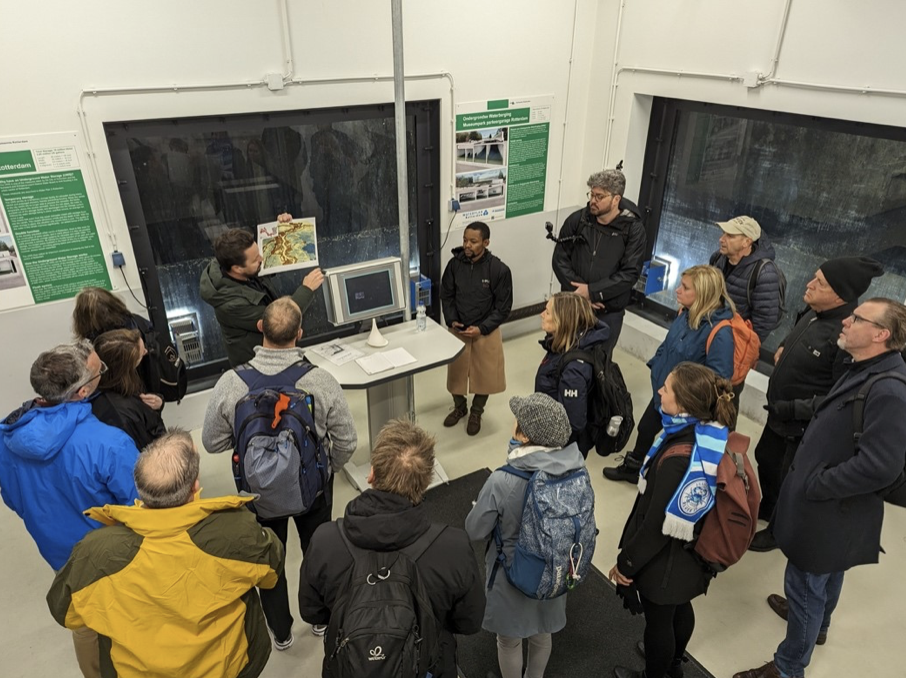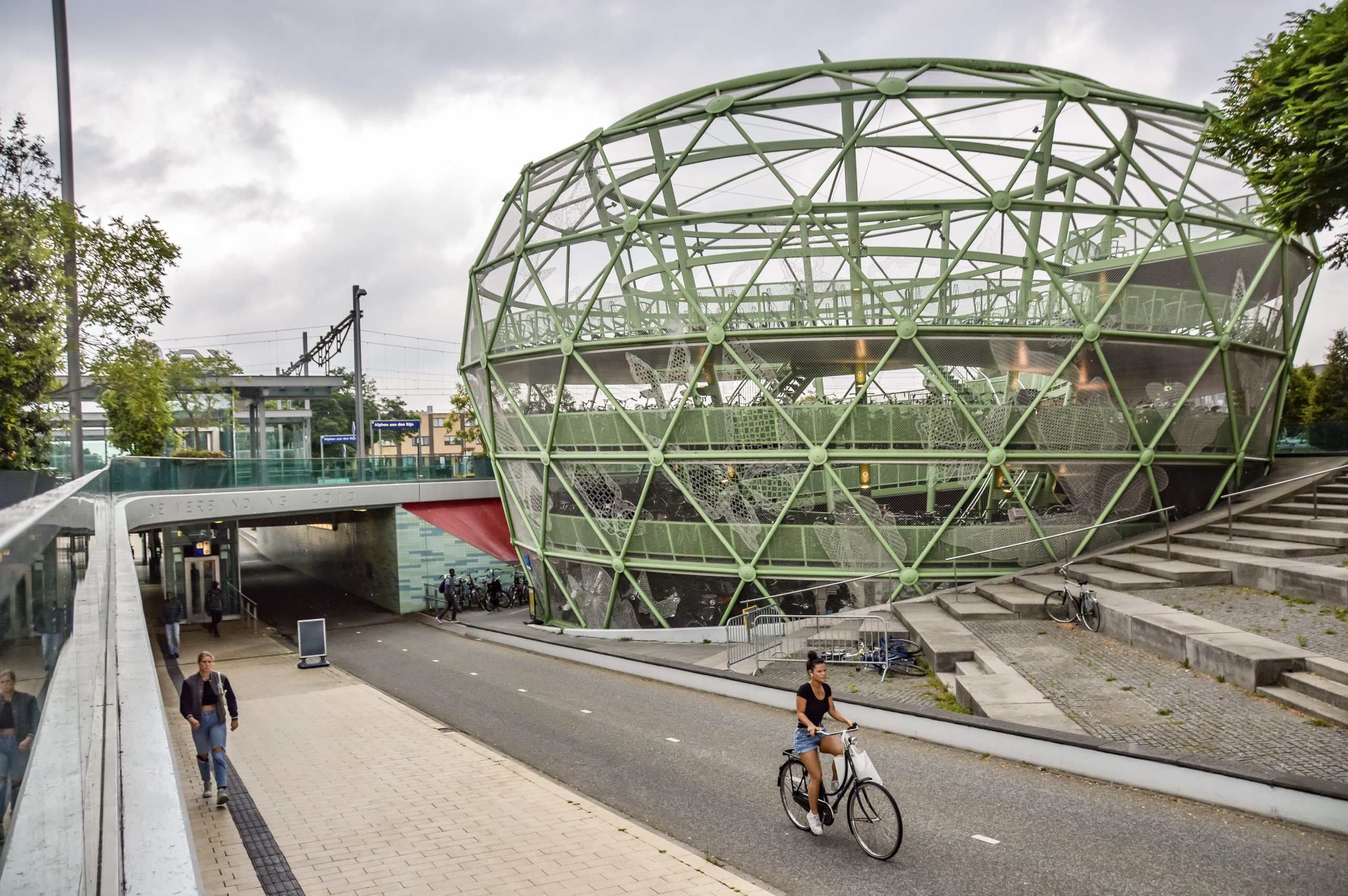Study visit from Annapolis, Maryland
17 November 2023From November 13th to the 16th, the Dutch Cycling Embassy (DCE), in collaboration with the Netherlands Water Partnership (NWP), welcomed a delegation from Annapolis, Maryland. Comprising representatives from the state, county, and city, the delegation expressed a dual interest in fortifying the coastal city’s water resilience and promoting active mobility. In response to these interests, the DCE and the NWP organized an integrated study visit, including insights from a diverse group of Dutch experts specializing in these topics.
Day 1 – The Hague
On the first day, we were welcomed at the Netherlands Water Partnership office, where Arjan Braamskamp kicked off the program with an introduction about the NWP. Seray Özsöylemez-Martherus and Victoria Elema from the Ministry of Infrastructure and Water Management then presented on the importance of Dutch water governance, addressing challenges posed by climate change and areas below sea level.
Following her, Shelley Bontje, project manager at the Dutch Cycling Embassy, engaged the delegation in an interactive session, encouraging them to brainstorm potential interventions for enhancing traffic safety. Mirjam Borsboom, representing the active mobility team at the Ministry of Infrastructure and Water Management, then shared insights into the evolution of the current Dutch bicycle culture through a combination of stimulation, national campaigns, infrastructure development, and international cooperation. Marco Mulders and Matthew Bearden from Arcadis concluded the morning session by shedding light on The Hague’s transition from a car-dominated city to a more bicycle-friendly environment through strategic mobility policies.
After the lunch break, the delegation embarked on a cycling tour through the Hague and Scheveningen, guided by experts Marco Mulders and Matthew Bearden. The tour included stops at various locations, where the experts gave an explanation about the choices made in urban planning. Along the route, the NWP had organized a visit to Bosch Slabbers, an office of landscape architects specialized in climate adaptation and water-sensitive design. Senior landscape architect Stijn Koole showcased several of the designs that Bosch Slabbers had worked on, offering perspectives on incorporating water management into the design process. After this stop, we continued our bicycle tour to Scheveningen’s multi-functional coastal protection scheme. Here, the delegation was shown how the protective dykes also served as a recreational boulevard with a cycling path. Although the wind was rather strong throughout the ride, we were lucky to end this inspiring day with a beautiful sunset.
Day 2 – Rotterdam
The second day we visited Rotterdam, home to Europe’s largest seaport. The day started with a visit to an underground water storage facility, cleverly designed to double as a parking garage. It serves as a temporary storage of rainwater during heavy rainfall and prolonged showers, taking the pressure of the city’s canals.

Following this visit, we proceeded to the next meeting point, where Lior Steinberg (Humankind) delivered a presentation on Rotterdam’s historical development, issues of inequality, and (social) housing in the city. Subsequently, Maurits Lopes Cardozo (City of Rotterdam/Bikeminded) delved into Rotterdam’s cycling policies and the central role cycling plays in the city’s ongoing mobility transition. Both presentations underscored the ongoing transformation of Rotterdam, which, despite its post-war car-centric reconstruction, is currently evolving into a bicycle-friendly environment with an emphasis on green spaces to enrich inner-city living. Finally, Joost de Kruijf (Argaleo) dived into data-driven cycle policy enhancements, showcasing how cycling data can effectively shape bicycle promotion efforts.
After lunch, Lior Steinberg guided a walking tour that highlighted several urban water resilience initiatives, including a community garden on an old railway track. Before picking up our bikes, he also showcased the bicycle parking garage below Rotterdam Central Station, amazing the delegation with the large quantity of parked bicycles. The day concluded with a cycle tour through Rotterdam, featuring stops related to (social) housing projects, water management, and cycle infrastructure.
Day 3 – Delft
The third day of the study visit took place in Delft, where we were welcomed at the Hoogheemraadschap van Delfland (Delfland Water Authorities). Hosted in a beautiful historic building, we received a presentation on the challenges faced by The Netherlands as a delta country. The significance of multi-level cooperation for efficient water management and the integration of water and soil into spatial planning were highlighted.
After this visit, the delegation cycled to Flood Proof Holland at the campus of the Technical University Delft, a testing and demonstration site for innovative flood defense solutions. The bike ride then continued to Huszar, where a lunch was followed by presentations. Pim van der Zwet (Decisio) discussed “bikenomics,” demonstrating how creating an economic model that shows the multiple benefits of cycling can support bicycle promotion initiatives. Hans Voerknecht (Een Nieuwe Kijk) presented on transport justice and the need for safe access to cycling infrastructure, particularly in low-income neighborhoods.
Hans Voerknecht also guided our afternoon bicycle tour, taking us to some of the social housing neighborhoods in Delft. The tour concluded at the TU Delft Campus with a presentation by Blue21 on a prototype of a floating platform that enables scalable and modular construction on water.
Day 4 and 5
The delegation continued their visit by attending the International Cycling Safety Conference on Thursday and concluded with a water resilience-centered program with the NWP on Friday.
It was a pleasure to host this delegation, and we hope that this study visit served as an inspiration to instigate positive changes in active mobility and contribute to the development of a resilient Annapolis!


